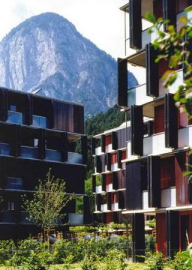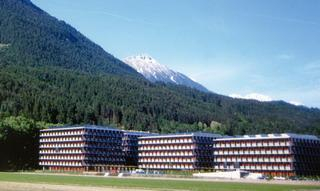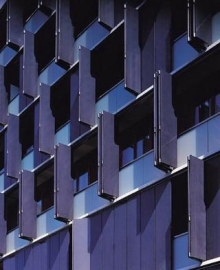Lohbach Residences
This housing development is located at the west end of the Franz-Baumann-Weg and forms the border between the residential and agricultural zones in the western part of Innsbruck. The 298 apartments of the complex are spread out over six buildings with five to seven storeys, accessed via a system of paved paths and areas. Designed by artists, these zones are car free and also utilised by children as playgrounds.
A covered entrance area leads to the large stairways lit from overhead from which the units are accessed. All openings to the outside are French windows providing access to the balconies that run around the buildings. As a result, each apartment disposes of generous free spaces accessible from every room. Shutters made of copper and parapets of satinated glass serve as a protection from sun and weather and provide privacy. There is a supervised daily home for elderly people in one of the buildings and apartments with special equipment for elderly or handicapped persons. All houses have direct access to the underground car park.
This new part of Innsbruck is characterised by sustainability, high ecological standards, comfort for the inhabitants and minimal operational costs. The energy savings for space heating and domestic hot water heating amount to approximately 70 per cent compared to conventional dwellings of the same size. The placement of these six extremely compact buildings with different height levels permits that the spaces between have been omptimised while providing for a high density. These spaces offer interesting views of the surrounding landscape and the use of the shutters on the balconies mediates the relationship between private and public life allowing for continual change and in accordance with the inhabitants needs.
The aim to use more software and less hardware in the whole planning process has been achieved without compromising on quality. Cost savings for the inhabitants have been achieved on invisible parts and both the generously dimensioned staircases with stone floors and the high standard of surface materials are not often found in social housing projects.



 © Edouard Hueber
© Edouard Hueber
 © Edouard Hueber
© Edouard Hueber